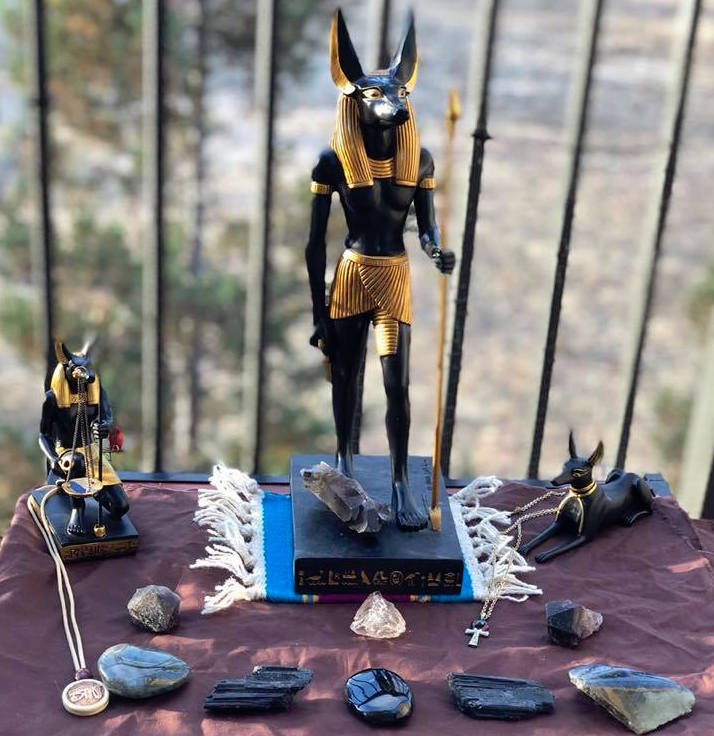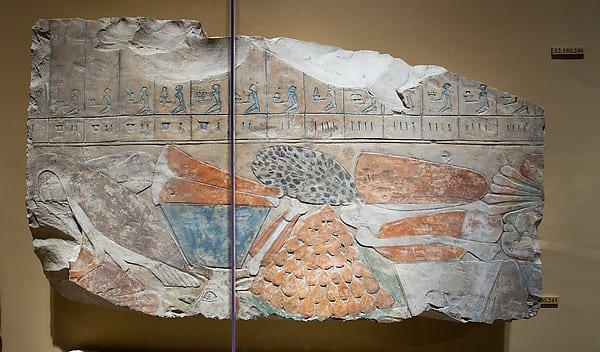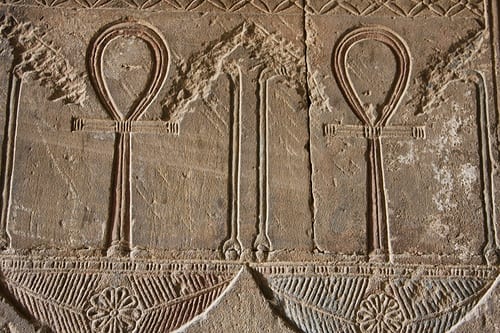What do you do when you begin working with a deity? Where do you go to deepen your relationship with them once you’ve established communication with them? A great place to start is to begin leaving offerings for them. Whether you’re a new pagan or experienced pagan, leaving offerings can be a great way to establish and to continue a relationship with a deity. Do your research. How did the worshipers of old honor them? What do modern followers commonly offer? What are common associations and correspondences with this deity?

If you read my last post, Transformation & Anubis, I talked about starting communications with the Liminal Lord. Transformation isn’t always easy, but it can be a powerful process that can lead to necessary changes in life. Once you begin to build a relationship with Anubis, you may want to consider leaving offerings to him. Offerings can take many forms – leaving food or items, ritual, or even acts of service towards a particular cause. In this article, I will cover a few of these possibilities.
Voluntary Acts of Service
I want to begin with acts of service because I think there are a lot of interesting and unique opportunities here to honor Anubis while also serving the community, many of them things that people may not think about.
Volunteer and/or donate at a local dog rescue shelter. Anubis holds all living things close to his heart, but canines are especially dear to him. Most local animal shelters will never turn down volunteers – they often are looking for people to walk the dogs, interact and socialize with them, clean their cages, and help with the distribution of medicine and feeding times.
If you can’t find the time to volunteer, consider donating to the shelter. I don’t think I’ve ever seen a shelter that didn’t need food, towels, newspapers, cat litter, or cleaning supplies. Even spending a few dollars to buy a bag of dog food can go a long way for dogs that desperately need care. Be sure to check with the shelter before donating to see what their needs are and what they accept. Sometimes they have specific needs.
You may even find shelters for rescued wolves and other canines. Near where I live in Indiana, there is a wolf facility (aptly named Wolf Park) dedicated to research and education related to these beautiful animals. They also welcome volunteers, though you may need special training before you can work with the animals in any capacity. Even if you don’t work directly with the animals, perhaps you can assist in the public education programs, or donate to their cause.
Perhaps working with animals isn’t your thing. That’s fine; don’t feel guilty about that. I spent a good amount of time in Anubis in the Darkness of Winter talking about Anubis’ role in medicine and healing. Hospitals and hospice facilities often accept volunteers to serve in a variety of roles. Nursing homes often welcome volunteers to socialize with residents.
Cemeteries
Being associated with the dead, it makes sense that one common association with Anubis is cemeteries and places of the dead. Cemeteries usually have caretakers, though the extent of the care may simply be to periodically cut the grass, depending on the size, location, and funding available.
Cleaning up trash and debris may be an option for voluntary service, though it would be best to check with the local government or institution in charge of the care of the cemetery to check whether or not it’s acceptable to do such a thing. Cleaning up a cemetery without permission may raise unwanted suspicion, even if it’s done with the best of intentions.
Leaving flowers on a stranger’s grave is a way to not only honor the memory of a dead person’s spirit, but also to give something in service to the Lord of the Dead, and you certainly don’t need permission to do so. Many people do things to honor strangers. Visit any local cemetery around any patriotic holiday, and you will often find people leaving flags and/or flowers at the grave of strangers. The same could be done in honor of Anubis with flowers, or even stopping for just a moment’s thought in honor of the deceased person, even someone you don’t know.

Creative Endeavors
Do you have a creative passion? Music, painting, sculpting, crafting, writing, drawing…these are all common artistic endeavors where many people have talents. Why not dedicate some of these to Anubis? Draw, paint, or sculpt something in his honor and put it on your altar, which I will talk about in the next section. I’ve seen some amazing artwork done dedicated to Anubis. Though I am not much of an artist myself, I still enjoy doodling and drawing in dedication to him.
Do you play any kind of music or sing? Dedicate a song to Anubis. It could be something you wrote yourself, or even a song you hear that reminds you of him.
Writing is one of the ways that I connect with Anubis. I write a lot. I do much better when I can sit down and really craft something into words the way that I want it. I keep a blog here, mostly about Anubis, but I also do a lot of personal writing that never gets published and is kept between me and Anubis. I know a lot of people who write stories and poems dedicated to their chosen deity.
Set up an Altar
Setting up an altar in your home is one of the most iconic ways to honor a deity. You should include some type of representation of Anubis, if you can. You can find many different statues of Anubis, ranging from small to large and in various colors and depictions. Many of them are inexpensive. A piece of artwork, even something hand-drawn yourself, would work well to include. There’s nothing that dictates it needs to be anything particular or something expensive. Make it meaningful and personal.
Add a couple of candles, in black and/or gold color (representing the light within the darkness). Not out of the broom closet? Find something such as a wolf, or even a dog, to include somewhere on a shelf. Perhaps add a candle to go along with it. It can be as simple and nonchalant as you wish.
There are many other things you can include on your altar, ranging from stones, incense, herbs, food and drink, or other signs and symbols. Dark stones and stones are commonly associated with Anubis, especially if they carry the properties of protection and transformation. Obsidian, smoky quartz, black onyx, labradorite, jet, and hematite are all common stones associated with Anubis.

Ritualistic Offerings
Another way to honor Anubis that may feel more traditional to some would be ritualistic offerings. Food, stones, incense, altars, and herbs are common things that come to mind for many.
Some of my favorite incense to burn in offering to Anubis include anything with a spiced, musky scent such as frankincense, sandalwood, myrrh, and cedarwood, though you may find other blends that work well. Some metaphysical stores even have a pre-made “Egyptian musk” blend, or using a similar name, that could be used in offering as well.
Food and drink were also common offerings to the gods and goddesses, the most common being beer and bread. It remains a common offering among modern Kemetic practitioners. There are some interesting myths involving this, including one involving the goddess Sekhmet (goddess of war and healing). Dark beers and ales as well as dark breads are common offerings to Anubis.
One of the symbols most commonly associated with Anubis are the ankh. The ankh looks similar to a cross with a loop at the top. The ankh was a hieroglyphic symbol that represented life, or the breath of life. The mortal life was seen as being just one piece of the journey of the soul, and the ankh represented not only that mortal life, but the afterlife as well.
Once you’ve established some regular things you can do in offering to Anubis, consider setting up a daily practice in honor of the Lord of the Night. There are lots of things that you can do to establish a daily practice. I will talk about some of these in a future article.


















